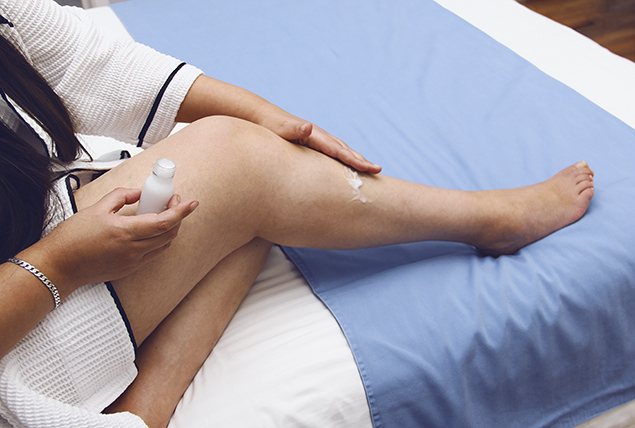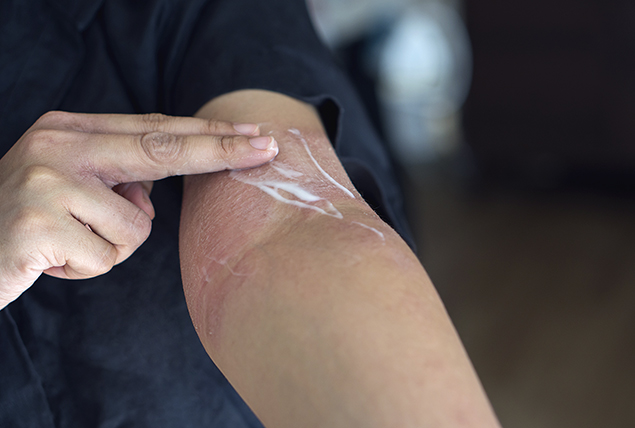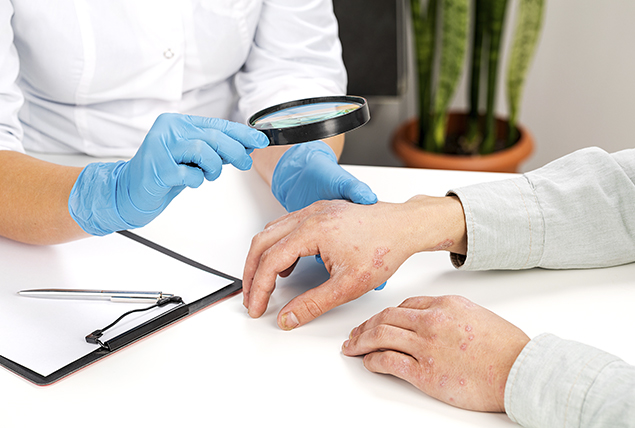Here's How to Maintain a High Quality of Life With Psoriasis

Have you ever spotted raised, red patches covered with silvery scales on your skin? This may be a telltale sign of psoriasis, a common inflammatory autoimmune condition experienced by 2 percent to 3 percent of the world's population. More than 8 million Americans suffer from the condition.
Not to worry, it's entirely possible to maintain a high quality of life with psoriasis.
Psoriasis most often appears on your scalp, knees, elbows, lower back and genitals. In addition to red, scaly plaques, psoriasis can take many other forms, including:
- Guttate psoriasis, which appears as little, pink, droplet-shaped lesions
- Inverse psoriasis, or smooth and shiny lesions in folds of the skin such as in your armpits, groin and under your breasts
- Pustular psoriasis, a rare psoriasis type that appears as pus-filled blisters
Medical professionals recommend you act quickly when seeking medical attention for psoriasis.
"[A psoriasis] diagnosis should be fairly simple for most dermatologists," said Geeta Yadav, M.D., a Toronto-based dermatologist at FACET Dermatology. "They will examine your skin, including on your scalp and nails, looking for telltale symptoms of psoriasis. They may also take a small biopsy to analyze your skin. This usually isn't necessary but can be helpful in cases when [it looks] like other scaly, red rashes."
Psoriasis has no cure, but patients often experience reduced symptoms and an improvement in their quality of life when undergoing a treatment regimen recommended by their physician, according to Vladyslava Doktor, D.O., a dermatologist and the owner of Skin Center Boston.
Doktor called this the golden age of treatment for psoriasis, citing biologics, new oral medications and potentate topical corticosteroids.
Treatment modalities to manage symptoms of psoriasis include the following:
- Topical medications, including steroids that inhibit inflammation and discoloration, and formulas using coal tar and salicylic acid that break down flakes and scales
- Oral and injectable medications, including oral retinoids, immunosuppressive drugs and oral JAK inhibitors
- Narrow-band UVB phototherapy, which slows the growth of your affected skin and reduces flare-up symptoms
Although diagnosing psoriasis is relatively quick and painless, and many options to help manage the condition exist, many people with psoriasis experience barriers to treatment due to the stigma, myths and misconceptions surrounding the disorder.
Despite the stigma, psoriasis is not contagious
Many patients share the same question about one commonly held yet incorrect psoriasis belief: Is psoriasis contagious?
"The most common myth about psoriasis is that it's contagious," said Fred Pescatore, M.D., a New York City-based family medicine physician and author who specializes in nutrition. "My patients will ask me if they can get psoriasis from touching someone who has it, or if someone who has psoriasis sits on a piece of furniture, if they can get it if they sit there afterward. I tell them, 'You can't get psoriasis from coming in contact with someone who has it, so no need to worry.'"
There's no possibility of "catching" or "spreading" psoriasis, but people with psoriasis can suffer from other worries and negative feelings surrounding the disorder.
"It's important to note that while psoriasis is not contagious, it can still have a significant impact on an individual's quality of life, causing discomfort, embarrassment and even depression," Doktor said. "Therefore, it's essential for those living with psoriasis to seek proper treatment and support to manage their condition effectively."
Managing psoriasis
For people with psoriasis, receiving a diagnosis and beginning a treatment regimen is only the beginning of a lifelong journey. Psoriasis is a chronic condition with no cure, so managing it long-term requires patience, commitment and support. Check out these expert tips for managing symptoms of psoriasis over time.
Adopt an anti-inflammatory diet and lifestyle
"Because psoriasis is an autoimmune disorder, chronic inflammation can worsen its symptoms," Doktor said.
Practice a well-balanced lifestyle that includes an anti-inflammatory diet free of peanuts, soy, dairy and gluten. Get regular exercise and avoid smoking and drinking alcohol.
Moisturize your skin
"If you live in a colder climate, try using a thicker moisturizer, especially after you get your skin wet," Pescatore said. "When you go outside, cover your skin so it's not directly exposed to the cold, dry air. Heated air in our homes and workplaces is typically drier and can steal from moisture levels in your skin. Add a humidifier to support your skin health. Also, increase your water intake."
Acupuncture
"Acupuncture is believed to be helpful for psoriasis, as it may reduce inflammation, boost the immune system and stimulate the body's natural healing processes," Doktor said. "It may also help reduce stress and anxiety, which are known triggers for psoriasis flares."
Doktor did note, however, that some people may find acupuncture helpful, but it is not a substitute for medical treatment. It should always be pursued under the supervision of a qualified practitioner.
Psoriasis and your sex life
If psoriasis is playing a leading role in your bedroom, you're not alone. Psoriasis can impact the skin on or near your genitals and is often accompanied by feelings of embarrassment, so people with psoriasis often report the condition hurts their sex lives and relationships.
Doktor recommended some strategies you can adopt today to minimize the impact of psoriasis on your sexual and relationship health.
Join a support group
"These groups can provide emotional support, information and resources to help individuals manage their condition and improve their relationships," Doktor said.
The National Psoriasis Foundation aims to create a community among those with psoriasis with a host of both in-person and online support groups.
Seek guidance from a mental health professional
Therapists are trained to help individuals cope with the emotional and psychological impact of psoriasis. They can provide strategies to manage the impact of the condition on their relationships.
"They can also work with individuals to develop effective communication strategies with their partners and address any sexual difficulties that may arise due to psoriasis," Doktor said.
Practice good self-care
Maintain a healthy diet, get enough sleep and manage stress. Those actions can contribute to overall well-being and improve sexual and relationship health for individuals with psoriasis, according to Doktor.
Communicate openly with your partner about psoriasis and its impact on intimacy
"Start with an honest conversation explaining what psoriasis is. Then, discuss what limitations it may cause on the intimacy of your relationship. That can help set expectations and alleviate any anxieties," Doktor said.
Provide educational materials or invite your partner to attend a doctor's appointment. Emphasize that psoriasis is not contagious and cannot be transmitted sexually.
"Encouraging your partner to ask questions and express feelings can help facilitate a constructive conversation," Doktor added.
For those whose partners experience psoriasis, Yadav recommended some techniques to best support your partner as they manage this chronic, often unpredictable condition.
"Hopefully, your partner already has a consistent routine to help manage their psoriasis, but it never hurts to support them by keeping a stash of gentle and nourishing skincare formulas available, as well as flake-fighting shampoos to combat scalp psoriasis," Yadav said.
Do they have psoriatic arthritis? Ask them whether they're comfortable or if they're experiencing joint pain, and plan activities accordingly. When they are frustrated by flare-ups, remind them that you love them. Most of all, don't be afraid to ask them how you can best support them.
Doktor said it's important to remember that while psoriasis can be a frustrating, overwhelming condition, it is possible to manage, even within the context of your nearest and dearest relationship.
"Overall, communication is key in any relationship, especially when managing a chronic condition like psoriasis. By being open and honest with a partner, individuals with psoriasis can reduce stress and anxiety and strengthen their relationship," Doktor said. "With proper management and self-care, individuals with psoriasis can live full and healthy lives."


















